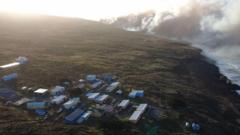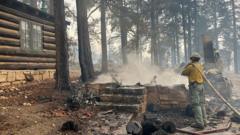For nearly a month, the French territory of Amsterdam Island, nestled in the southern Indian Ocean, has faced severe wildfires that have consumed over 55% of its 54 square kilometer area. This scientific research haven, which has no permanent residents but has hosted researchers since the 1980s, has seen a series of blazes that threaten both the environment and ongoing atmospheric studies.
Wildfires Ravage Amsterdam Island: A Call for Urgent Action

Wildfires Ravage Amsterdam Island: A Call for Urgent Action
A month-long wildfire devastates Amsterdam Island, posing risks to both research and biodiversity.
The fire, reportedly sparked in mid-January near the Pointe Bénédicte observatory, prompted an urgent evacuation of 31 scientists to Réunion Island. The situation escalated as high winds—reaching up to 40 km/h—and dry conditions contributed to the flames' rapid spread, often fueled by the island's network of peat bogs. Satellite imagery has indicated damage to the island’s solar panels and disruption to communications and food supplies, increasing concerns over the ecological impact on local wildlife.
Amid these challenges, conservationists are worried about the fire's implications for the island's rich biodiversity, which includes unique species like the Amsterdam Albatross and the southern elephant seals. The island's isolation has made it a valuable site for studying atmospheric changes without pollution interference.
Mark Delotte, the director of the Laboratory for Climate and Environmental Sciences (LCES), acknowledged the setback in atmospheric research, highlighting that this is the first suspension of studies in 45 years. To assess and secure the area, a reconnaissance mission featuring firefighters and technical staff has recently set out, aiming to restore essential services and investigate the fire's origins.
As authorities work to manage the crisis, the Amsterdam Island wildfires underscore the urgent need for robust fire management strategies in vulnerable ecosystems, emphasizing their critical role in environmental research and preservation.
Amid these challenges, conservationists are worried about the fire's implications for the island's rich biodiversity, which includes unique species like the Amsterdam Albatross and the southern elephant seals. The island's isolation has made it a valuable site for studying atmospheric changes without pollution interference.
Mark Delotte, the director of the Laboratory for Climate and Environmental Sciences (LCES), acknowledged the setback in atmospheric research, highlighting that this is the first suspension of studies in 45 years. To assess and secure the area, a reconnaissance mission featuring firefighters and technical staff has recently set out, aiming to restore essential services and investigate the fire's origins.
As authorities work to manage the crisis, the Amsterdam Island wildfires underscore the urgent need for robust fire management strategies in vulnerable ecosystems, emphasizing their critical role in environmental research and preservation.



















